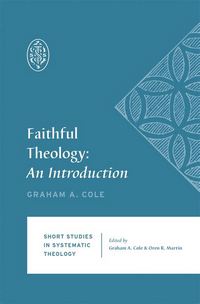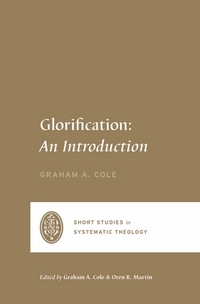I’m supposed to be posting about the latest book in this series tonight, but I just don’t like the way the post turned out. So I’m taking another crack at it (which almost never works, but I have to try). So here’s a rerun while I try to remember how to string sentences together.
 |
Faithful Theology: An Introductionby Graham A. Cole Paperback, 106 pg. Read: June 27, 2021 |

…faithful theology is a human project that arises from wise reflection on the self-revelation of God. Because it is our reflection on God’s revelation, it is always to be reformed and corrected by that revelation…it is one thing to have an evangelical’s high view of Scripture. It is quite another to know how to derive teaching (doctrine or theology) from Scripture.
Cole’s purpose in this is to give his readers a method to use in “doing faithful theology.” Moving from Scripture to doctrine. Trying to balance orthodoxy, orthokardia, and orthopraxy (right opinion, right-heartedness, right practice of life), Cole organizes his approach through five elements, exploring each in a chapter. The first element is the foundation on which the others are built—God’s self-revelation in Scripture. The second is reflecting on the witness of the theology and practice of the Church through history—not on an equal footing with Scripture, but it should inform how we approach doctrine. The third element is realizing our context as we do theology—we’re in a fallen world, yet we are redeemed and are awaiting the return of Christ. Our thinking, our theologizing needs to be done fully aware of what that means. The fourth is centered on wisdom. We need to be wise in our application of the previous. The last element puts all of the above together and focuses it in a doxological direction—our theology should be a service to God.
Throughout, Cole uses examples of these principles applying to Christological and Trinitarian thought. There are some other examples, too, Which is a tremendous help—if for no other reason than they’re bedrock doctrines on which there should be no disagreement. He brings up baptismal practices at one point as an example of something where there’s an opportunity for a divergence of opinion, standing in contrast to Trinitarian dogma.
So, what did I think about Faithful Theology: An Introduction?
This is an easy read, full of solid, useful advice. I found it a little wanting, a little…uninspired? A little basic? I’m not sure precisely what word I want but it’s somewhere in that vicinity. But it’s supposed to be basic—it’s an introduction. It’s a tool to be used as someone begins working on their theology. So, what do I know?
The for Further Reading and books/articles suggested in the footnotes are helpful, but I didn’t feel inspired to track any of them down right away, but they seemed like solid and useful recommendations.
The last chapter, where he brought all the ideas together and gives a great example of how to use his elements in shaping our Trinitarian dogma is great. It makes all the rest of the book worth it.
It’s good stuff, I think it’ll be helpful to a lot of readers. I just wanted a bit more. I think Swain’s book on the Trinity left me with higher expectations. I’m looking forward to the next book I get in this series to see which of these first two are more representative of the series as a whole.

This post contains an affiliate link. If you purchase from it, I will get a small commission at no additional cost to you. As always, opinions are my own.
![]()



